July by the Numbers jersey #28 sees a return to the Land of the Free and the Home of the Brave.
Even non-hockey fans know of the
Miracle on Ice, the massive upset when the
United States won the gold medal at the 1980 Olympics under the brilliant training and tactics of the late
Herb Brooks, who took a team of college amateurs into battle against the dominant veterans of the Soviet Union.
What followed was not so memorable...
The 1981 World Championships resulted in a 5th place finish, followed by a Semifinal loss to Canada at the 1981 Canada Cup> That preceded the disaster that was the 1982 World Championships, where a 0-6-1 record saw them relegated to the B Pool for 1983. The Americans then won the B Pool in their first try, earning an immediate promotion back to the A Pool.
There were no World Championships in 1984, as that was an Olympic year, with the games contested in Sarajevo, Yugoslavia. Expectations for the Americans were certainly high going into the tournament coming off the previous Olympics in 1980, but reality set in quickly as the US lost it's opening game to Canada by a score of 4-2 followed by a lackluster 4-1 loss to Czechoslovakia two days later. Desperately needing a win, the best the Americans could muster was a 3-3 tie against tiny Norway after being outshot 37-27, leaving them with a single point from three games. The US rebounded with a 7-3 win over Austria, but, already eliminated from medal contention, they closed out their tournament with another tie, this one against Finland. The United States finished with a 1-2-2 record, scoring 16 goals while giving up 17 and wound up classified a disappointing 7th. Members of the team included future stars Chris Chelios, Al Iafrate, Pat Lafontaine and Ed Olczyk.
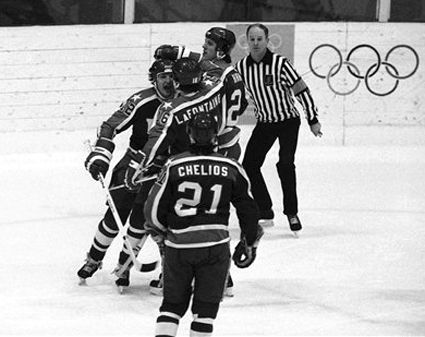
Chris Chelios joining Pat Lafontaine and their US teammates to celebrate a goal in 1984
Later that fall, the 1984 Canada Cup saw the United States get off to a strong beginning with a 3-1-1 record in the Round Robin portion, but Sweden ended their tournament with a resounding 9-2 decision during their first game of the elimination playoffs.
The 1984 US Canada Cup Team
The 1985 World Championships were a bright spot for the US, as they finished second in Group A with a 4-2-1 record to advance to the Final Round, but dropped all three games to Canada, Czechoslovakia and the Soviet Union to miss out on the medals with a final classification of 4th.
5 losses in 7 games sank the American hopes at the 1986 World Championships with consecutive defeats at the hands of Sweden, Czechoslovakia, Canada and the Soviet Union after starting the tournament an encouraging 2-1. An identical result followed in 1987, which included losses to Canada, Sweden, the Soviet Union and Finland in their first four games.
The 1987 Canada Cup was another disappointment, as the US lost 3 of 5 games, missing out on the Playoff Round entirely.
They hoped for better at the Olympics in 1988, as the games were in more familiar territory in North America in Calgary, Alberta. A more favorable schedule saw them begin with a confidence building 10-6 pounding of Austria to open their tournament, but once more the Czechoslovakians exposed the American defenses with a 7-5 win. There would not be another miracle in 1988, as the Soviet Union, in their first Olympic meeting since 1980, duplicated the Czechs with a 7-5 win. Norway fell 6-3 as expected, but any hope of advancing to the Final Round was dashed when the US fell flat against West Germany 4-1, to finish 2-3 and find themselves classified 7th once more. Members of this team included familiar names like Mike Richter, Brian Leetch and Kevin Stevens.
The 1988 US Olympic Team
The 1989 World Championships saw the US finish 6 out of 8 with a 2-4-1 record before they improved to a 5th place in 1990, winning 3 but losing 4.
In 1991, the United States gutted out a 4-1 win over Czechoslovakia following an opening 4-3 loss to Canada. They took a point away from their game with Sweden after a 4-4 tie, but the hammer of reality came down upon them with great vengeance and furious anger when the Soviet Union won 12-2. Still, more points arrived with a 4-2 defeat of Switzerland, a 4-4 tie against Germany and a 2-1 win over Finland to put the US into the Final Round. But once again could not compete with elite nations, losing to the Soviets 6-4, Sweden 8-4 and Canada 9-4 to again place out of the medals.
The Canada Cup returned in the fall, and the US started out with a 6-3 win over Sweden, followed by a 6-3 loss to Canada. Then a 4-2 win over Czechoslovakia and 2-1 defeat of the Soviet Union and a 4-3 win over Finland propelled them to a second place finish in the Round Robin portion. In the playoffs, Finland fell easily 7-3, but hosts Canada won the Canada Cup with 4-1 and 4-2 wins in the best-of-three final. Like the Stanley Cup playoffs, only the winner received a trophy and no medals were awarded.
Albertville, France was the location of the 1992 Olympics and the US found themselves in the weaker of the two groups, avoiding Canada, Czechoslovakia and the Unified Team, made up of former members of the Soviet Union. They took full advantage of their schedule, reeling off wins against Italy 6-3, the now reunited Germany 2-0, Finland 4-1 and Poland 3-0 before a final tie against Sweden 3-3. This gave the US first place in Group A and a favorable draw against France in the Quarterfinals. The US took care of business 4-1 but fell to the Unified Team 5-2, which sent them to the bronze medal game. There, the deflated Americans were soundly handled by Czechoslovakia 6-1 for a final classification of 4th following their initial run of success. Their roster boasted Bret Hedican, Shawn McEachern and Keith Tkachuk.
The 1992 US National Team
Later in the spring, the 1992 World Championships saw the US advance to the Quarterfinals, only to be slammed by the Czechs 8-1. 1993 was a repeat, advancing to the Quarterfinals before losing 5-2 to Sweden.
In order to get the Winter Olympics off of the same schedule as the Summer Olympics, the next Games were held just two years later in 1994 in Lillehammer, Norway. The first game for the United States set the tone for what was to follow, as the US came away disappointed following a 4-4 tie with France. Again, their game against Slovakia resulted in another deadlock, this one 3-3. While they would certainly have preferred a win, taking away a point from their 3-3 tie against Canada was somewhat less disappointing. A 6-3 defeat at the hands of Sweden put them in peril, but they US took full advantage of Italy to move on to the Final Round after a 7-1 win. Their medal hopes came to an abrupt end with a 6-1 hammering at the hands of Finland. Two additional losses to Czechoslovakia (5-3) and Germany (4-3) in the Classification Round saw the US classified as 8th. Well known names from the 1994 team were University of Maine teammates Mike Dunham and Garth Snow in goal, Peter Laviolette and Brian Rolston.
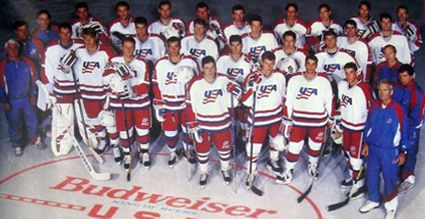
The 1994 US Olympic Team
1994's World Championships had the US advance to the Quarterfinals with a winning 3-2 record, followed by a stunning 3-1 win over Russia, but again, a 8-0 pounding by Finland ruined the joy created by their win over the Russians. With a bronze medal on the line, once again the US did not answer the bell, taking the shine off their tournament with a 7-2 loss to Sweden.
United States hockey was now on the upswing as a new generation of players were now on the scene, and Group 2 of the 1995 World Championships went to the Americans with a 3-0-2 record. Their reward? A matchup with Canada, who had stumbled in Group 1 (finishing behind Italy and France), but came alive in a 4-1 win over the US to end their tournament.
The 1996 World Championships began as expected, as the US defeated Austria, Germany and Slovakia, but lost to Russia and Canada. Still, it was enough to advance again to the Quarterfinals, where they surprised many with a 3-2 victory over Sweden.
While Czechoslovakia dominated them with a 5-0 win in the Semifinals, this time the United States regrouped and earned their first medal in international competition since the 1980 Olympics with a 4-3 win over Russia when 1994 Olympian Rolston scored at 4:48 of overtime.
In addition to being the first medal of any kind for the US in 26 years, it was their first medal at the World Championships in 34 years, all of which puts the medal won in 1980 into a greater perspective, as the Americans were not regular medalists either prior to, or after, the 1980 Olympics. In fact, the US was in Pool B of the World Championships as recently as 1974 before rising to their unexpected and truly memorable gold in 1980.
Today's featured jersey is a 1981 United States National Team Reed Larson jersey. This style was worn by the United States in the 1981 Canada Cup tournament and was very similar to the template worn by the Winnipeg Jets, and to some degree the Toronto Maple Leafs, with it's full length arm stripes in red trimmed with white, which is repeated to great effect along the waist.
Simple stars on the shoulders give it a touch of patriotism and the diagonal USA cresting is in the classic style of the New York Rangers, making for a simple, effective and attractive design has has stood the test of time with ease.
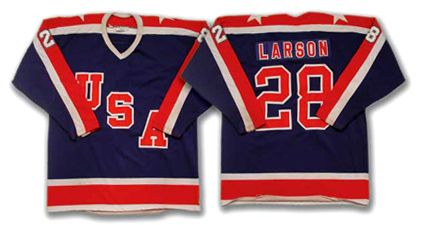
Today's video section is rare footage of Rolston scoring his overtime goal in 1996 to earn the United States their first medal in international competition in 16 years.


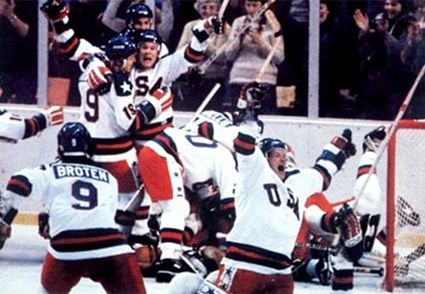

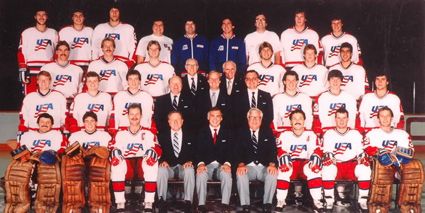
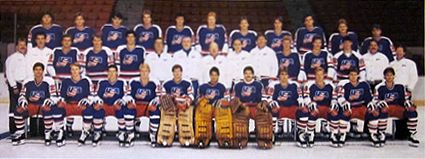
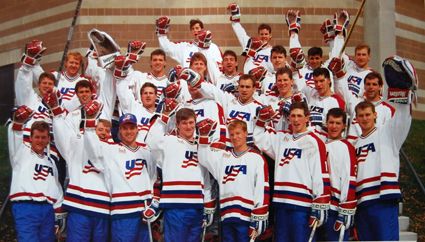











No comments:
Post a Comment
We welcome and encourage genuine comments and corrections from our readers. Please no spam. It will not be approved and never seen.